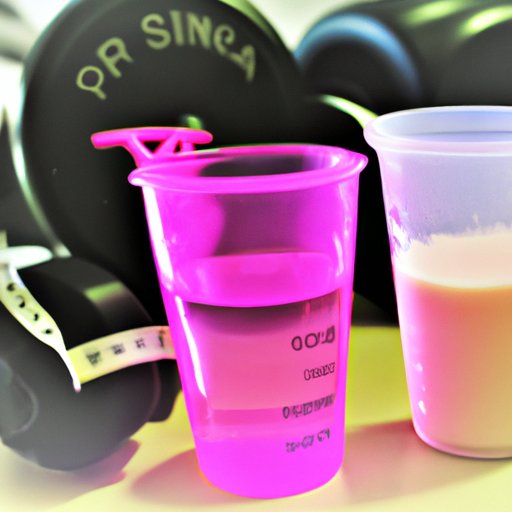
I. Introduction
If you’re someone who wants to lose weight or build muscle, chances are you’ve heard about protein shakes or drinks. The popularity of these drinks has surged in recent years, and many people wonder if they help in reaching their fitness goals. However, on the flip side, questions arise asking whether protein drinks make you gain weight.
In this article, we’re going to explore the relationship between protein drinks and weight gain. We’ll discuss the pros and cons of consuming protein drinks, how they affect weight gain and loss, the science behind protein, and much more.
II. Do Protein Drinks Make You Gain Weight?
The answer is relatively straightforward, but it depends on the context. Yes, protein drinks can make you gain weight, but only if you consume them in excess. Protein is a macronutrient that helps repair and build muscles, so it’s necessary for gaining strength and recovery after workouts. However, consuming an excessive amount of protein will contribute to weight gain, just like any other macronutrient would.
A significant factor that determines whether you’ll gain weight or not is the number of calories you consume overall, including those from protein shakes. So if you’re consuming more calories than you burn, weight gain is inevitable. Conversely, if you’re on a low-calorie diet and replacing some meals with protein drinks, they can help you lose weight by keeping you satiated and helping to control cravings.
III. Pros and Cons of Protein Drinks for Weight Loss/Toning Up
When it comes to protein drinks and weight loss, opinions are divided. Here we’ll examine some of the most significant pros and cons of incorporating protein drinks into a weight loss or toning up plan, and back them up with science when appropriate.
Pros:
- Protein drinks help build and repair muscle tissue, which enhances the effectiveness of your workout
- They help keep you satiated and control food cravings
- They are highly convenient and portable
- They are an efficient way to get all the necessary proteins in the diet, as they come in various flavors and can be added to smoothies or baked goods.
Cons:
- Some protein shakes contain added sugar or artificial sweeteners, which can contribute to unwanted weight gain
- In some cases, consuming protein shakes solely, without other nutrient-rich foods, may lead to nutritional deficiencies.
- They may be less satisfying than a real meal, leading to overconsumption later on
- They tend to be more expensive than other protein-rich foods such as chicken or beans
Undoubtedly, the pros of protein shakes outweigh the cons, but as with all foods, choosing the right type and consuming them in moderation is key.
IV. The Science Behind Protein and Weight Gain
The role of protein in weight management is significant. Protein is beneficial for weight loss and muscle gain, and consuming protein drinks alongside other protein-rich foods can help individuals maintain a balanced and healthy diet.
While protein drinks come with many benefits, it’s important to note that consuming protein-rich foods from whole-food sources is always the optimal choice. Whole foods offer fiber, vitamins and minerals that lack in processed protein shakes.
V. Protein Drinks and a Balanced Diet/Exercise Regimen
Individuals who want to build muscle or who engage in intense workouts can benefit from consuming protein drinks alongside horizontal whole food intake. Protein drinks can be beneficial post-workout as it can help the muscles that have been broken down repair more efficiently.
Combining protein shakes with eating healthy, nutrient-dense foods will help make you fuller, reduce cravings, and provide the energy needed to stay active and achieve your target weight.
VI. Beyond the Science: Marketing, Diet Culture, and Protein Drinks
Some brands tend to market protein drinks as a shortcut to building an Instagram-worthy body, perpetuating a toxic culture of focusing on appearance rather than overall health.
The diet culture associated with protein shakes and weight gain is a major issue that often leads to individuals’ unhealthy eating habits and body image issues. It’s essential to approach weight management from the perspective of general health and consume protein drinks as part of a balanced, overall healthy diet.
VII. Conclusion
In conclusion, protein drinks are undoubtedly beneficial, but only when consumed correctly and as part of a balanced, overall healthy diet. Protein shakes can help you gain muscle, lose weight and repair muscle tissue. But, like all foods, consuming protein drinks in moderation is key.
Individuals can improve their fitness and achieve their target weight by consuming protein drinks alongside whole foods, engaging in regular exercise, getting enough sleep, and developing a positive attitude towards health.
Now it’s over to you. What is your view on protein drinks? Share your thoughts and experiences in the comments section.





